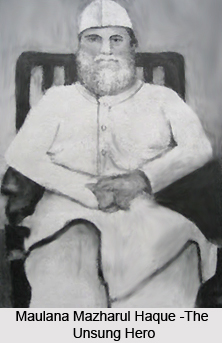 Maulana Mazharul Haque, was the enlightened activist, the man who was a concrete supporter in absolute Independence being "the birthright of every Nation". His world view had been one of humanist right and influential affluence on Indian mass.
Maulana Mazharul Haque, was the enlightened activist, the man who was a concrete supporter in absolute Independence being "the birthright of every Nation". His world view had been one of humanist right and influential affluence on Indian mass.
Early Life of Maulana Mazharul Haque
Maulana Mazharul Haque was born to a rich landlord, Sheikh Ahmedullah, in Bahpura, Thana Bihta of Patna district on December 22nd, 1866. As he received his primary education at home by Maulvi Sajjad Hussain, he passed matriculation with flying colours from the Patna Collegiate in 1886. Later he joined Canning College in Lucknow for higher studies but same year saw him leaving for England to pursue a course in Law. He started legal practice in Patna after his return from England in 1891.
When some students quit government schools and colleges on Gandhi`s movement for the Independence of India, Maulana Mazhrul Haque bought a garden in the outskirt of Patna, set up temporary accommodation to help continue the education of those students and the place was named `Sadaqat Ashram`. Later, it became central office of All India Congress, in Bihar.
Career of Maulana Mazharul Haque
After obtaining his bar at law from London Haque returned to India in 1891 and started his practice in Patna. He became politically close to Mahatma Gandhi when both were studying in London.
Maulana is celebrated for his noteworthy respite work during the famine in Saran, in 1897, his dynamic role in the Non-Cooperation and Khilafat Movements and in the Champaran Satyagraha, in 1917, along with Mahatma Gandhi. Mazhrul Haque also organised Home Rule Movement in Bihar and was its president in 1916.
He founded a weekly English newspaper `The Motherland`, in 1921, which soon became a mouthpiece of the Non-Cooperation Movement laying bare the essential activities undertaken during the movement.
A significant contribution to relief efforts by this veteran leader was offered as he launched during the famine in Saran district of Bihar in 1897. Maulana Mazharul Haque`s civic as well as public life actually commenced with the creation of the Bihar Provincial Conference, a move he supported to the core as he held notions about the dire need for the constitution of Bihar as a separate province.
Mazhrul Haque who was born in Bahpura, and after his retirement from politics he died in his home `Ashiana` in Siwan district, Bihar.
Year 1906 witnessed Maulana being elected as the Vice Chairman of Bihar Provincial Congress Committee. Mazharul Haque helped organize the Home Rule Movement in Bihar and was its President in 1916. He actively participated in the Champaran Satyagraha for which he was sentenced to 3 months imprisonment.
Subsequently, when the Non Cooperation and Khilafat Movements were launched, Mazharul Haque sacrificed his lucrative legal practice and his elected post as member of the Imperial Legislative Council and turned all his efforts to the freedom struggle. By now, he was a staunch believer in complete Independence being "the birthright of every Nation".
Contribution of Maulana Mazharul Haque
Mazharul Haque was also a fervent campaigner in democratic decentralization and he organized the Panchayats in Saran district towards the congregative convention this vision. He was the one who advocated for better educational facilities in Bihar, especially for free and compulsory primary education. Thus in a way he is behind the establishment of the modern Bihar as India sees her! Maulana Mazharul Haque actively participated in anti-purdah movement launched in Bihar in retort to the Non-Cooperation Movement of 1920. Mahatma Gandhi sought to bring women also into mainstream politics, to strengthen the resistance against British rule as well as empower them to play a more active role in society. The purdah system espoused by Muslim and many Hindu families, especially in Bihar, meant that women remained behind men in all spheres of life.
In 1919, he gave up and burnt his western attire to adopt traditional Muslim attire. He was given title of "Desh Bhushan Faqir Mazharul Haque".
1920, he donated his 16 bigha land on Patna- Danapur road for Sadaqat Ashram and Vidya Peeth which served as college for students who left government colleges in response to Non-Cooperation Movement. Sadaqat Ashram played important role in Independence movement in Bihar.
Maulana also launched his weekly magazine "The Motherland" from Sadaqat Ashram. He also jailed for his articles in this magazine. Sadaqat Ashram continues to serve as headquarters of Bihar Congress.
Maulana was firm believer of Hindu-Muslim unity. His famous quote sums up his conviction, "Whether we are Hindu or Musalmaan we are in the same boat, we must sail or sink together".
When in London, Maulana established Anjuman Islamia. This brought Indians of various religion, region and sects under one umbrella. This was also place to discuss about India`s problem. Mahatma Gandhi first met Maulana Mazharul Haque in Anjuman Islamia, London.
Person who donated everything for the country has hardly got due recognition. Maulana donated the house where he was born, to start Madrasa and middle school within same compound in 1926. Idea behind establishing both in one campus was to promote communal harmony.




















